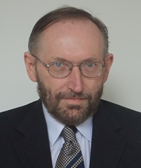KEYNOTE & invited SPEAKERS
Keynote Speaker I

Prof. Witold Pedrycz (IEEE
Fellow)
University of Alberta, Canada
Dr. Witold Pedrycz (IEEE Fellow, 1998) is Professor and Canada Research Chair (CRC) in Computational Intelligence in the Department of Electrical and Computer Engineering, University of Alberta, Edmonton, Canada. He is also with the Systems Research Institute of the Polish Academy of Sciences, Warsaw, Poland. In 2009 Dr. Pedrycz was elected a foreign member of the Polish Academy of Sciences. In 2012 he was elected a Fellow of the Royal Society of Canada. In 2007 he received a prestigious Norbert Wiener award from the IEEE Systems, Man, and Cybernetics Society. He is a recipient of the IEEE Canada Computer Engineering Medal, a Cajastur Prize for Soft Computing from the European Centre for Soft Computing, a Killam Prize, a Fuzzy Pioneer Award from the IEEE Computational Intelligence Society, and 2019 Meritorious Service Award from the IEEE Systems Man and Cybernetics Society. His main research directions involve Computational Intelligence, fuzzy modeling and Granular Computing, knowledge discovery and data science, pattern recognition, data science, knowledge-based neural networks, and control engineering. He has published papers in these areas. He is also an author of 21 research monographs and edited volumes covering various aspects of Computational Intelligence, data mining, and Software Engineering. Dr. Pedrycz is vigorously involved in editorial activities. He is an Editor-in-Chief of Information Sciences, Editor-in-Chief of WIREs Data Mining and Knowledge Discovery (Wiley), and Co-editor-in-Chief of Int. J. of Granular Computing (Springer) and J. of Data Information and Management (Springer). He serves on an Advisory Board of IEEE Transactions on Fuzzy Systems and is a member of a number of editorial boards of international journals.
Invited Speakers
Invited Speaker I

Prof. Abhijit Sen
Kwantlen Polytechnic University, Canada
Dr. Abhijit
Sen is a Professor of Computing Science and
Information Technology at Kwantlen Polytechnic
University in BC, Canada. Holding a Ph.D. from
McMaster University in Hamilton, Ontario,
Canada, a Master of Science degree from the
University of California, Berkeley, USA, and a
B.Tech in Electrical Engineering from the Indian
Institute of Technology, Kharagpur, India, Dr.
Sen brings a wealth of academic and industry
expertise to his role.
With over 30 years of experience, Dr. Sen has
made significant contributions in both academia
and industry. He has held key roles in
organizations such as Canadian Aviation
Electronics, Montreal, Canada, and Microtel
Pacific Research, Burnaby, Canada. His
consulting experience includes notable projects
with Canada Post, Montreal, and InfoElectonics,
Montréal, Canada.
Dr. Sen's international impact extends beyond
Canada. He has served as a visiting professor at
prestigious institutions including Waikato
University, Hamilton, New Zealand, University of
Applied Sciences, Munich, Germany, Centre for
Development of Advanced Computing (CDAC), India,
North China Institute of Aerospace Engineering,
China, and Technical University of Applied
Sciences, Regensburg, Germany.
Throughout his career, Dr. Sen has been a
keynote speaker at various international
conferences, demonstrating his thought
leadership in the field. He has also contributed
significantly to the academic community by
serving as a reviewer and technical committee
member for numerous international conferences,
and notably, he has served on the editorial
boards for a number of conference proceedings
publications. Additionally, he has acted as an
external examiner for Ph.D. theses at several
universities.
His current research interests span diverse
domains, including Wireless Networking and
Security, Radio Frequency Identification (RFID),
Computing Education and Teaching Methodologies,
Distributed Systems and Databases, System
Developments, DevOps, and Artificial
Intelligence.
Dr. Sen's dedication to education is underscored
by his receipt of the Distinguished Teaching
Award from Kwantlen Polytechnic University, BC,
Canada. He is a Life Member of the Institute of
Electrical and Electronics Engineers (IEEE) and
has actively served in the Executive Committee
of IEEE, Vancouver Chapter. His contributions
have been recognized by the IEEE, Vancouver
chapter, highlighting his unwavering commitment
and individual contributions to the
organization.
Invited Speaker II

Associate Professor Thitirat
Siriborvornratanakul
National Institute of Development Administration
(NIDA), Thailand
Dr. Thitirat Siriborvornratanakul is an Associate Professor at the Graduate School of Applied Statistics, National Institute of Development Administration (NIDA), Thailand. She earned her Ph.D. in Engineering from the University of Tokyo, Japan, where she specialized in advanced computational intelligence and interactive systems. Her research interests are at the intersection of Artificial Intelligence (AI), Deep Learning, and Human-Computer Interaction (HCI), with a focus on applying machine learning techniques to enhance user experience, improve decision-making processes, and develop intelligent systems. Dr. Siriborvornratanakul has published extensively in peer-reviewed SCImago Quartile 1 (Q1) journals and international conferences, contributing significantly to the fields of AI-driven systems, computer vision, and natural language processing.
Invited Speaker III

Associate Professor Marshima Mohd Rosli
Universiti Teknologi MARA, Malaysia
Marshima Mohd Rosli is an Associate Professor in the Department of Computing Sciences at the College of Computing, Informatics, and Mathematics, Universiti Teknologi MARA, Malaysia. She holds a PhD in Computer Science from the University of Auckland, New Zealand. Her research primarily focuses on software engineering, system development, artificial intelligence, and data analytics. She has contributed numerous publications to renowned conferences and journals such as IEEE and ACM.